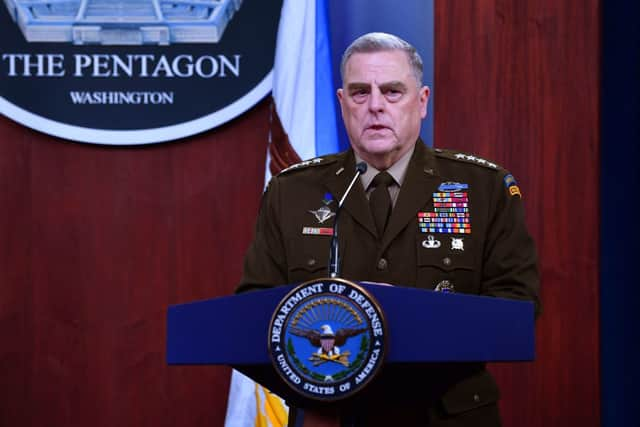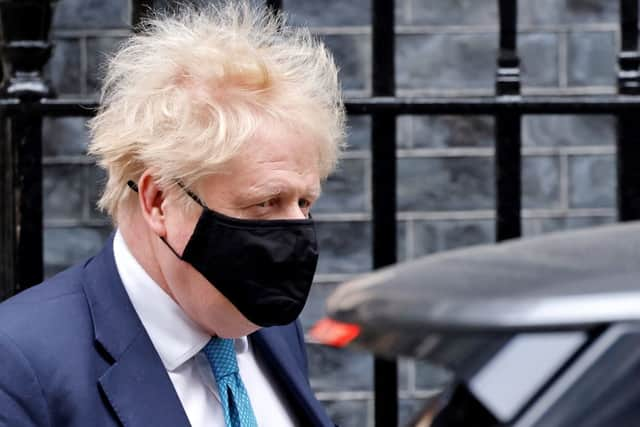Ukraine: what Joe Biden said as he warned there is a ‘distinct possibility’ Russia could invade next month
This article contains affiliate links. We may earn a small commission on items purchased through this article, but that does not affect our editorial judgement.
and live on Freeview channel 276
US President Joe Biden has warned that there is a “distinct possibility” Russia could take military action against Ukraine next month.
Mr Biden told the Ukrainian President that invasion is now “virtually certain”, the White House said.
Advertisement
Hide AdAdvertisement
Hide AdUS officials have since warned any conflict in the region would be “horrific” - although they said they did not believe Russian President Vladimir Putin had yet made a “final decision” on whether or not to invade Ukraine.


Russia has said it saw “little ground for optimism” in resolving the crisis after the US again rejected the country’s main demands this week.
It has warned of “retaliatory measures” should its security demands not be met.
What did Joe Biden say?
Mr Biden made the comments in a telephone conversation with Ukrainian President Volodymyr Zelensky on Thursday (27 January).
Advertisement
Hide AdAdvertisement
Hide AdWhite House National Security Council spokesperson Emily Horne said: “President Biden said that there is a distinct possibility that the Russians could invade Ukraine in February.
“He has said this publicly and we have been warning about this for months. "
During their conversation, Mr Biden "reaffirmed the readiness of the United States along with its allies and partners to respond decisively if Russia further invades Ukraine", a White House statement said.
Mr Zelensky said they "discussed recent diplomatic efforts on de-escalation and agreed on joint actions for the future".
Advertisement
Hide AdAdvertisement
Hide Ad

The US has also sought to reassure the EU it will help them find alternative gas supplies if Russia cuts them off. EU nations rely on Russia for around a third of their gas supplies.
This comes after the US threatened to block the completion of the Nord Stream 2 pipeline from Russia to Germany if Moscow invades Ukraine.
Ned Price, a US State Department spokesperson, said: "I want to be very clear: if Russia invades Ukraine one way or another, Nord Stream 2 will not move forward.
"We will work with Germany to ensure it does not move forward."
Advertisement
Hide AdAdvertisement
Hide AdCould Russia invade Ukraine?
Russia has built-up around 100,000 troops near the border with Ukraine in recent weeks, stoking fears of an invasion.
Moscow has denied it is planning an attack on its former Soviet neighbour, but last month made wide-ranging security demands from the West.
This included never allowing Ukraine to join the Nato military alliance.
The US rejected this demand, while offering what it called a "serious diplomatic path forward" to Moscow.
Advertisement
Hide AdAdvertisement
Hide AdKremlin spokesman Dmitry Peskov said on Thursday that the US response left "little ground for optimism", but added "there always are prospects for continuing a dialogue, it’s in the interests of both us and the Americans".
UK Defence Secretary Ben Wallace has admitted he is “not optimistic” a Russian incursion into Ukraine can be stopped as he prepares to meet his counterpart, Sergei Shoigu, in Moscow.
Mr Wallace told the BBC from Germany there was still “a chance” an invasion could be halted, but said: “I’m not optimistic.”


It comes after Foreign Secretary Liz Truss said the UK is not ruling out support for personal sanctions against President Vladimir Putin in the event Russia invades Ukraine.
Advertisement
Hide AdAdvertisement
Hide AdShe is set to meet face-to-face with her Russian counterpart Sergei Lavrov in Moscow within the next two weeks.
Speaking on Friday (28 January), Mr Lavrov said the Kremlin is prepared to take “retaliatory measures” unless a guaranteed security agreement is reached with the West.
"If our attempt at reaching an agreement on mutually acceptable principles of the provision of European security fails, we will resort to retaliatory measures," he said.
On Saturday (29 January), the UK revealed Prime Minister Boris Johnson will visit the region in the coming days and would also hold a phone call with Vladimir Putin.
Advertisement
Hide AdAdvertisement
Hide AdA Downing Street spokesperson said: “The Prime Minister is determined to accelerate diplomatic efforts and ramp up deterrence to avoid bloodshed in Europe.
“He will reiterate the need for Russia to step back and engage diplomatically when he speaks to President Putin this week.”
It is believed Mr Johnson is also considering a range of options to alleviate Russian aggression in the region, including fresh deployments and bolstering Nato’s defences.
A message from the editor:
Thank you for reading. NationalWorld is a new national news brand, produced by a team of journalists, editors, video producers and designers who live and work across the UK. Find out more about who’s who in the team, and our editorial values. We want to start a community among our readers, so please follow us on Facebook, Twitter and Instagram, and keep the conversation going. You can also sign up to our newsletters and get a curated selection of our best reads to your inbox every day.
Comment Guidelines
National World encourages reader discussion on our stories. User feedback, insights and back-and-forth exchanges add a rich layer of context to reporting. Please review our Community Guidelines before commenting.
